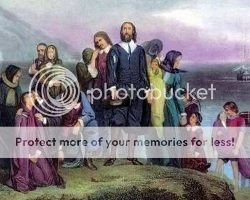
The Puritans
In the national debate over religious freedom and Religious Freedom Restoration Acts passed in some states, it’s important to define our terms. Religious freedom means one thing to religious conservatives and another thing for progressives who support church and state separation. I don’t know if it’s good to know the debate has been going on since the founding of this country.
Sheila Suess Kennedy at the Indianapolis Business Journal had a post about the history of religious freedom:
It was while researching “God and Country” that I came across Frank Lambert’s illuminating description of the difference between the Founding Fathers and those he calls the Planting Fathers.
The first set, the Planting Fathers, came to the colonies for religious liberty, which they defined as “freedom to do the right thing.” They came to America to build a “Shining City on the Hill,” and most of them believed that God wanted them not only to follow the “right way,” but also to make sure their neighbors did, too. To them, religious freedom meant that government would establish the “correct” religion.
When George Washington 150 years later swore to “faithfully execute the office of President of the United States,” he undertook to “preserve, protect and defend” a Constitution those Planters would have found incomprehensible. The new constitution was the product of the men we call the Founding Fathers, and it made no reference whatever to God or divine providence, citing as its sole authority “the people of the United States.”
That view meshes with the historical record. The early colonists didn’t come here so people could pray how they wanted or not, they came here to impose their “correct” version of religion on others. If you didn’t conform you were punished.
We’ve been fighting that battle ever since. I think the idea of religious freedom, as held by the founding fathers, based on their exposure to the enlightenment, is better for all of us (including religious conservatives) and not the planting fathers idea of forcing religion on others as a form of “freedom”.
